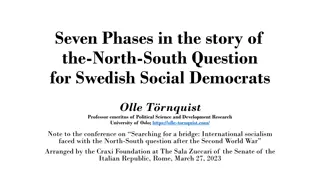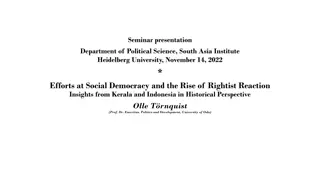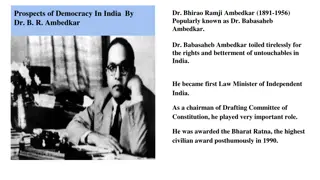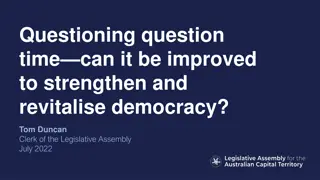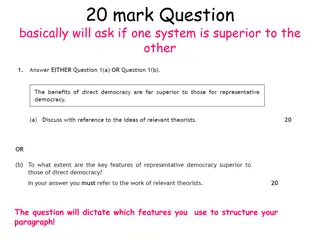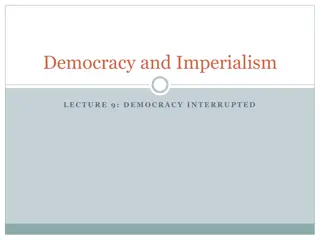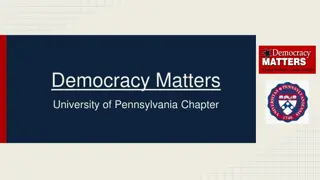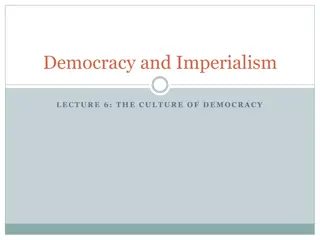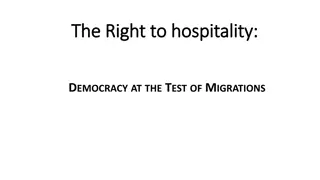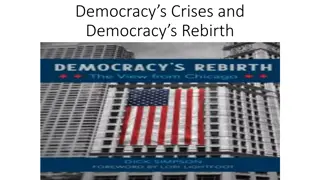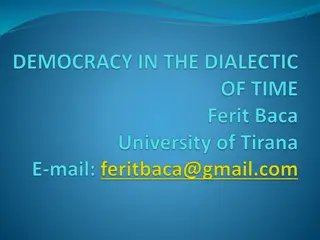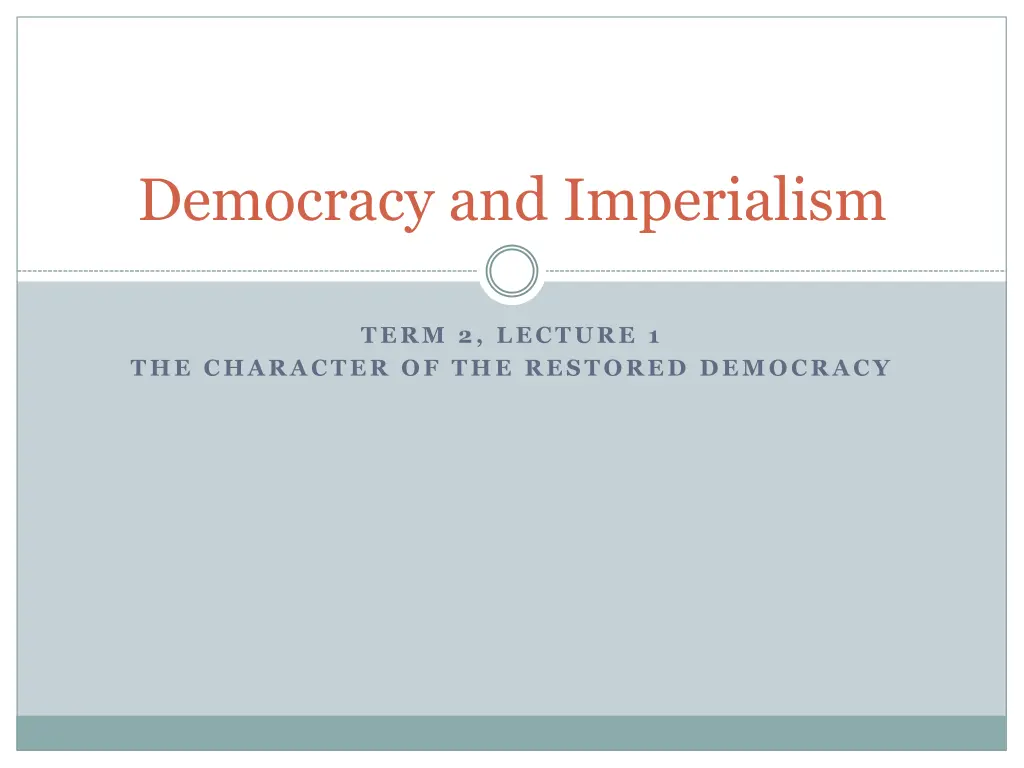
The Restored Democracy: Legacy, Changes, and Challenges
Explore the legacy of the Thirty, the differences between fourth-century and fifth-century democracy, and the characteristics of the restored democracy in ancient Athens. Delve into key questions surrounding ideology, practice, and historical events like the trial of Socrates.
Download Presentation

Please find below an Image/Link to download the presentation.
The content on the website is provided AS IS for your information and personal use only. It may not be sold, licensed, or shared on other websites without obtaining consent from the author. If you encounter any issues during the download, it is possible that the publisher has removed the file from their server.
You are allowed to download the files provided on this website for personal or commercial use, subject to the condition that they are used lawfully. All files are the property of their respective owners.
The content on the website is provided AS IS for your information and personal use only. It may not be sold, licensed, or shared on other websites without obtaining consent from the author.
E N D
Presentation Transcript
Democracy and Imperialism TERM 2, LECTURE 1 THE CHARACTER OF THE RESTORED DEMOCRACY
Democracy restored Thrasybulus rebels defeat Thirty and liberate Athens General amnesty Process of republishing laws resumed
Sources for fourth-century democracy Xenophon s Hellenica: historical narrative down to 362 Assembly and court speeches: c. 150 survive, mostly from fourth-century Attic orators Political philosophy, constitutional history: nearly all fourth century The restored democracy s epigraphic habit: over 1000 decrees, laws, inventories, and lists of councillors, ephebes, trierachs, allies, etc.
Key questions What was the legacy of the Thirty in the ideology and practice of democracy? How did fourth-century democracy differ from its fifth-century predecessor? What was the purpose of its changes? How do we characterise the restored democracy?
The shadow of the Thirty But when they were close to the gates, and grounded arms before entering the city, Aesimus spotted [Agoratus, a known informer for the Thirty] and went up to him, seized his shield, and flung it away, telling him Go to hell! There s no place in the procession to Athena for a murderer like you. Lysias 13.81 Thibron also asked from the Athenians three hundred cavalrymen ( ) And the Athenians sent some of those who had served as cavalrymen in the time of the Thirty, thinking it would be a gain to the democracy if they should go abroad and die there. Xen. Hell. 3.1.4 Suppose that he were now under scrutiny for admission to the Council, and he had his name registered on the tablets as having served in the cavalry under the Thirty: even without an accuser you would reject him. Lysias 26.10
The trial of Socrates (399) Anytus, through public prosecutor Meletus, accuses Socrates of Not worshipping the gods, and introducing new gods Corrupting the youth 1. 2. Socrates antagonises jury, which sentences him to death
Socrates and the Thirty The Thirty sent for me with four others to come to the tholos and ordered us to bring Leon the Salaminian from Salamis to be put to death. They gave many such orders to others also, because they wished to implicate as many in their crimes as they could. ( ) But when we came out of the tholos, the other four went to Salamis and arrested Leon, but I simply went home. Plato, Apology 32c-d Did you put to death Socrates the sophist, fellow citizens, because he was shown to have been the teacher of Critias, one of the Thirty who put down the democracy? Aeschines 1.173
The trial as part of the healing process Socrates: known critic of democracy, close ties to Alcibiades, Critias, and others Exile of Xenophon (395/4?) another victim of popular anger? Not long afterwards the Athenians felt such remorse that they closed the exercise grounds and gymnasia. They banished the other accusers, but put Meletus to death; they honoured Socrates with a bronze statue. Diogenes Laertius, Lives of Eminent Philosophers 2.43
Inoculation against oligarchy Despite opposition rich-poor & anti-democratic philosophy in elite circles, no 4th-century Athenian advocated oligarchy Democracy never threatened between 403-322 If we compare our own government which is criticized by everyone not with the old democracy which I have described, but with the rule which was instituted by the Thirty, there is no one who would not consider our present democracy the work of the gods. Isocrates 7.62
The restored democracy Eleventh was the constitution established after the return from Phyle and from Peiraeus, from which date the constitution has continued down to its present form, constantly increasing the power of the masses. For the people has made itself master of everything, and administers everything by decrees and by jury courts in which the people is the ruling power, for even the cases tried by the Council have come to the people. And they seem to act rightly in doing this, for a few are more easily corrupted by gain and by influence than the many. [Arist.] Ath. Pol. 41.2
More radical, or less? Democracy discredited by defeat, trial of the generals No more imperial tribute to fund democracy By 405, a good part of the political power of the thetic class was at the bottom of the Aegean (Strauss 1986)
A familiar core Nine Archons Areopagus Council Board of 10 generals Council of 500 Assembly
Less radical: a curtailed Assembly Assembly may still pass decrees (psephismata), but not laws (nomoi) Decrees can be appealed and annulled if found to be against the laws Assembly loses jurisdiction in eisangelia trials the last of the Assembly s judicial powers
Less radical: elite magistrates Increasing number of magistracies filled by election rather than sortition: treasurers, architects, superintendent of springs Offices filled for longer terms (some as many as 4 years) Pay for office not reintroduced; only Council members get an allowance Increasing tolerance for personal glorification: Assembly awards statues, inscriptions, crowns
More radical: the capstone of democracy Assembly pay introduced somewhere in 390s Initial pay 1 obol, soon raised to 2, then 3; by Aristotle s time, 1 drachma; 9 obols for special sessions (Ath. Pol. 62.2) Purpose: increased participation? Equal representation? Bribing the masses?
More radical: the power of the jury courts Jury courts become nomothetai (lawmakers) Jury courts handle graph paranomon (when decrees are declared unconstitutional) Jury courts handle eisangelia trials Jury courts handle dokimasia and euthynai (scrutiny of magistrates before & after term of office)
The rule of the law court The laws which rule us have made these jurymen rulers of all. Demosthenes 24.118 For I see, men of Athens, that the decisions of your courts have more authority not only than those of the Halimusians who have expelled me, but more even than those of the Council and the Assembly; and justly so; for in all respects the verdicts of your courts are most just. Demosthenes 57.56 For the things which uphold our democracy and preserve the city's prosperity are three in number: first the system of law, second the vote of the jury, and third the method of prosecution by which the crimes are handed over to them. The law exists to lay down what must not be done, the accuser to report those liable to penalties under the law, and the juryman to punish all whom these two agencies have brought to his attention. Lycurgus 1.3-4
Politics through the courts All magistrates personally accountable to jury courts All court cases (inc. graph paranomon)involved accusers and accused Personal vendettas played out for juries; debates over policy waged in the law courts
The character of the restored democracy Power shifted from Assembly to courts but both are samples of the demos Jury courts as subcommittees of the Assembly Career magistrates ensure efficient rule
The true Athenian democracy? Assembly pay ensures equal access to power Council no longer sets agenda of Assembly Politics no longer dominated by old leisure-class clans Oligarchy is unthinkable!

